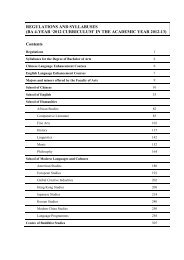Bachelor of Arts (BA) - The University of Hong Kong
Bachelor of Arts (BA) - The University of Hong Kong
Bachelor of Arts (BA) - The University of Hong Kong
Create successful ePaper yourself
Turn your PDF publications into a flip-book with our unique Google optimized e-Paper software.
181GEOG2026.Principles and practice <strong>of</strong> ecotourism (6 credits)(This course is also <strong>of</strong>fered to second and third year non-<strong>BA</strong> students for inter-Faculty broadeningpurposes.)Ecotourism is the result <strong>of</strong> increasing interest amongst consumers in exploring the natural world as analternative to more conventional holidays, along with a desire to reduce the environmental and culturalimpact <strong>of</strong> their activities. This course introduces to students the basic principles and practices <strong>of</strong>ecotourism, including its prospects and problems from the points <strong>of</strong> view <strong>of</strong> host populations, touristguests, environmentalists and tourism organisations. It leads students to examine the delicateinteractions between tourism and the ecosystem by studying cases from five continents. It alsoencourages them to explore the prospects <strong>of</strong> ecotourism development in China through examiningecotoursim practice in the country.Assessment: 40% coursework, 60% examination.This course will be <strong>of</strong>fered in the second semester.GEOG2027.China's tourism resources and management (6 credits)(This course is also <strong>of</strong>fered to second and third year non-<strong>BA</strong> students for inter-Faculty broadeningpurposes.)This course provides a comprehensive introduction to China's tourism resources and management.Through the study <strong>of</strong> the works by a multidisciplinary group <strong>of</strong> scholars, it explores China's burgeoningtourism industry. Students are encouraged to trace the historical evolution <strong>of</strong> China's developmentpolicies regarding the country's tourism resource and management, as well as the organisations <strong>of</strong> theindustry including the hotel business and hospitality.Assessment: 40% coursework, 60% examination.This course will be <strong>of</strong>fered in the second semester.GEOG2028.Population geography (6 credits)This course provides the student with a basic understanding <strong>of</strong> the forces bringing about populationchange. Students will be introduced to the three fundamental demographic variables, fertility, mortalityand migration, and how these interact to generate changes in population structure. Marriage patternsand family formation are considered in intercultural contexts. <strong>The</strong> basic factors accounting forpopulation distribution and redistribution will be outlined. <strong>The</strong> relationship between population and theenvironment is a central theme and due consideration will be given to ideas <strong>of</strong> overpopulation on theone hand and to population growth as a necessary condition for human development on the other.Models <strong>of</strong> the demographic transition and <strong>of</strong> the interaction between migration and fertility will beexamined. Specific attention will be paid to the ageing <strong>of</strong> human populations, to population policies andto the impact <strong>of</strong> diseases such as HIV/AIDS to give a comprehensive introduction to the major issuesfacing the world's population as it moves into the 21st century.Assessment: 40% coursework, 60% examination.This course will be <strong>of</strong>fered in the second semester, and taught over a period <strong>of</strong> 6 weeks.
















